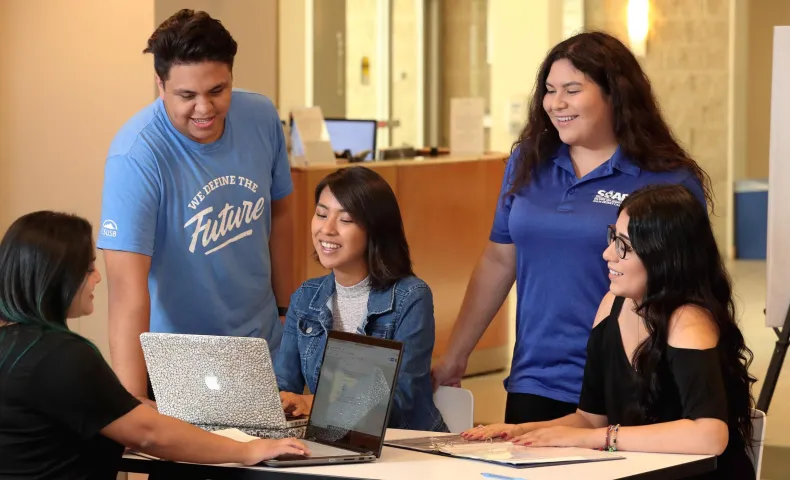 Photo by Cal State University San Bernardino
Photo by Cal State University San Bernardino
Dreaming Higher
Today, 11 million undocumented people live in a state of constant uncertainty and fear that they could be ripped from their lives and the people they love at any moment. And yet these aspiring Americans continue to work, live, learn and pursue their dreams—strengthening the communities and institutions they’re an integral part of. Inspiring examples abound at California’s colleges and universities as faculty, staff, administrators, and students come together to support undocumented students and their families, funded by the California Campus Catalyst Fund.
The Campus Catalyst Fund is a multimillion-dollar, three-year initiative funded by the Haas, Jr. Fund and 13 other funders to expand support for undocumented students and their families across the state’s three public higher education systems: California Community Colleges, California State University, and University of California.
The Undocumented Student Success Center at California State University San Bernardino is one of 32 projects supported by the California Campus Catalyst Fund. Its mission is to empower current and prospective undocumented students and families to realize their academic aspirations by providing a safe space, mentorship, and support through educational workshops, legal support, engagement opportunities, and community service. The campus currently serves 700 self-identified undocumented students.
We sat down with Cal State San Bernardino President Tomás D. Morales to learn more about the Center and the difference it makes for students.
Why is the Undocumented Student Success Center important to the mission of CSUSB?
We’re a very diverse campus—75 percent students of color, 65 percent Latinx, and 80 percent are the first in their family to earn a baccalaureate degree. We have some of the poorest students in American higher education. So supporting historically marginalized students is part of our DNA. We want our undocumented students to use the services that all students have access to—the career center, financial aid office, academic advising, athletics, etc. We have a number of student success centers that are focused on the needs and challenges of those specific constituents—Pan-African, First Peoples, Latinx and Queer & Transgender Resource Center. We are creating pathways for all of our students to use the full resources of the university.
How has life changed for undocumented students and their families since the center began, and what challenges remain?
They have more support and feel less alone, but the challenges they’re up against remain daunting, especially navigating what to do after graduation. Many students didn’t apply for DACA (Deferred Action for Childhood Arrivals) because of fear or they weren’t old enough to apply when the program was terminated. For those undocumented students, graduation can seem like the end of the road. You have a bachelor’s degree, but you can’t be employed. We now have a program to help students explore additional post-baccalaureate options, including graduate school and opportunities to earn a living through freelancing and entrepreneurship.
CSUSB has taken a holistic approach, supporting not just undocumented students, but also their families. Why is that important?
The big difference for our undocumented students is that they are fearful they’ll go home and not find their family. The fear our students live under every day—that their mother could have been deported—is unacceptable.
Parents, whether poor or undocumented, want the best for their children. We initiated programming for parents of undocumented students so they can help younger siblings navigate the K- 12 school system. Parents may not go to the school meetings, especially nowadays, because they’re scared of being deported.
We try to provide a nurturing environment for the entire family, because these families are contributing to the American economy. There’s a great need for a highly educated workforce to meet the economic demands of the Inland Empire and the state of California if we’re going to have a prosperous future. It’s critical that undocumented students have the opportunity to pursue their own dreams, but also to contribute to the economy of the state of California.
What do you see as the role of philanthropy—like the foundations supporting the California Campus Catalyst Fund—in supporting undocumented students to thrive in public higher education?
Philanthropy is critically important to level the playing field, to address the manifestations of poverty, and provide students with high-impact practices. Undocumented students desperately need money for paid fellowships, scholarships, and books.
Students who have permanent residency or are citizens have access to federal financial aid that can cover the full course of a student’s education. California does offer resources to undocumented students, but the federal government does not. There are states that don’t allow undocumented students who graduated from a high school in that state to get in-state tuition. Fortunately, California is not one of those states, but that is why we need comprehensive immigration reform. These are students that will make America great. These students are very talented and very smart; they just simply are undocumented.